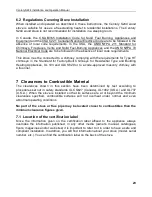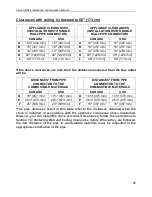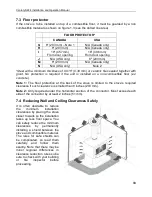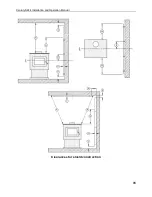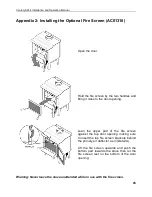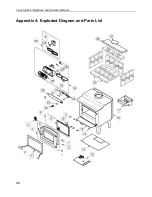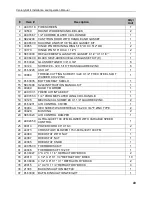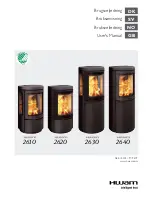
Century S244 Installation and Operation Manual
38
8.2.2 Masonry Chimneys
The stove may also be connected to a
masonry
chimney,
provided
the
chimney complies with the construction
rules found in the building code
enforced locally. The chimney must
have either a clay liner or a suitably
listed stainless steel liner. If the
masonry chimney has a square or
rectangular liner that is larger in cross
sectional area than a round 6” flue, it
should be relined with a suitably listed
6” stainless steel liner. Do not
downsize the flue to less than 6” unless
the venting system is straight and
exceeds 25 feet in height.
passing through a combustible wall, the
use of an insulated listed thimble
required.
8.3 Minimum Chimney Height
The top of the chimney should be
tall enough to be above the air
turbulence caused when wind
blows against the house and its
roof. The chimney must extend at
least 1 m (3 ft.) above the highest
point of contact with the roof, and
at least 60 cm (2 ft.) higher than
any roof line or obstacle within a
horizontal distance of 3 m (10 f
S244 Installation and Operation Manual
The stove may also be connected to a
masonry
chimney,
provided
the
chimney complies with the construction
rules found in the building code
enforced locally. The chimney must
have either a clay liner or a suitably
ss steel liner. If the
masonry chimney has a square or
rectangular liner that is larger in cross
sectional area than a round 6” flue, it
should be relined with a suitably listed
6” stainless steel liner. Do not
downsize the flue to less than 6” unless
venting system is straight and
exceeds 25 feet in height. When
passing through a combustible wall, the
an insulated listed thimble is
Minimum Chimney Height
The top of the chimney should be
tall enough to be above the air
caused when wind
blows against the house and its
roof. The chimney must extend at
least 1 m (3 ft.) above the highest
point of contact with the roof, and
at least 60 cm (2 ft.) higher than
any roof line or obstacle within a
horizontal distance of 3 m (10 ft.).






